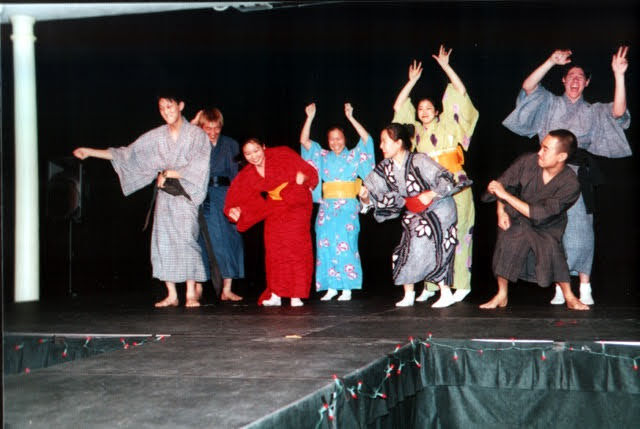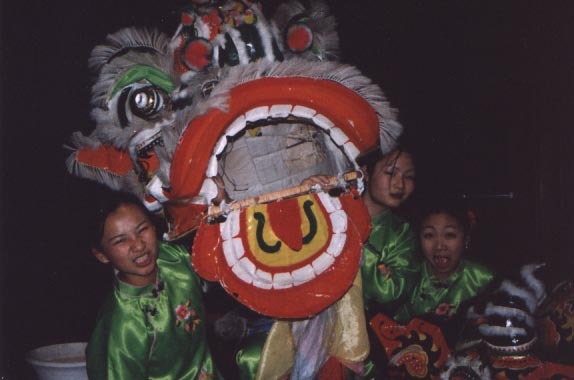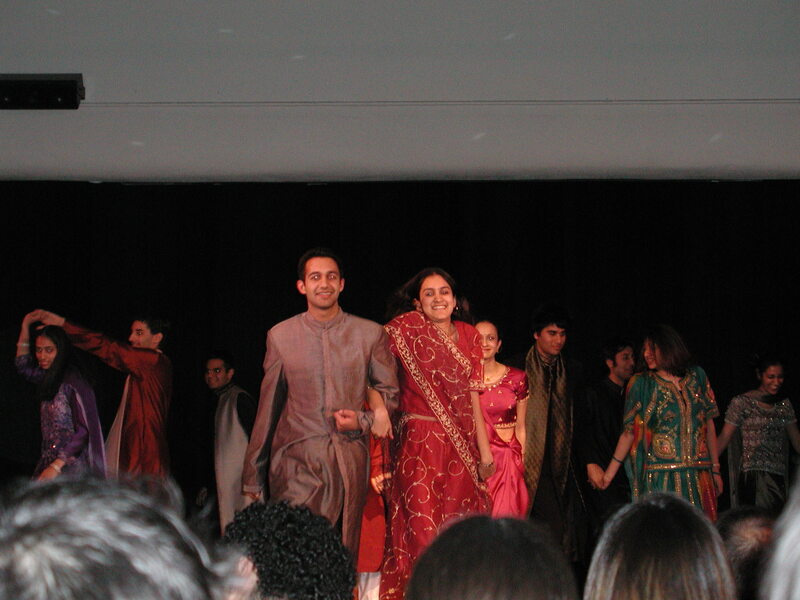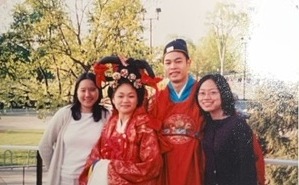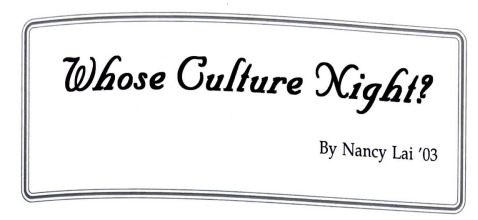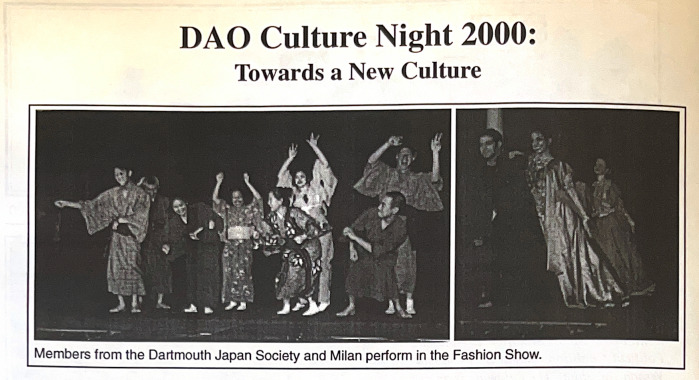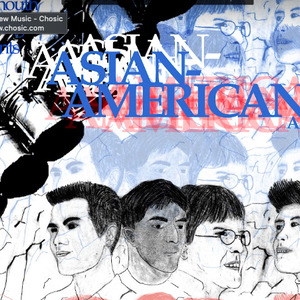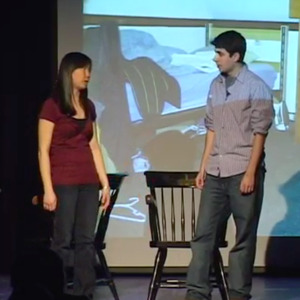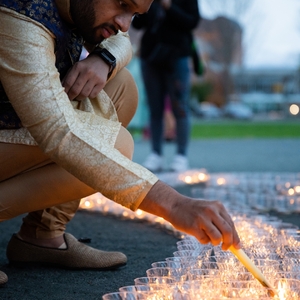Asian American Affinity Group Performances
Throughout Dartmouth's history, there have been many Asian American affinity groups that produced and performed several acts in a display of culture and/or politics. These acts ranged from dance troupes that showed their pride through dance and movement to student-produced plays about the Asian and Asian American experience. We highlight some examples here, but there are many of Asian American performances that are not explicitly featured here.
Content Statement: Some of the following content presented in this exhibit contains topics of sexual harassment and harmful statements toward Asian/Asian Americans and other marginalized groups. Take care before browsing.
Culture Nights
Culture Nights were one of the most popular performances hosted by Asian American student groups on Dartmouth's campus. Several groups such as Dartmouth Asian Organization (DAO), Milan, the Dartmouth Chinese Cultural Society hosted their own shows at the Collis Center about their respective group's cultural experiences. These events were composed of three core tenets: music, food, and other performances of culture.
And many Culture Night events would be collaborations of several student groups such Culture Night 2000 being a joint collaboration with DAO, Dartmouth Chinese Society, Dartmouth Korean American Students Association, Milan, and Dartmouth Japanese Society. And other Asian American performance-specific groups such as the Dartmouth Asian Dance Troupe and Far Off Broadway were invited to give their own performances while also promoting their groups.
“I remember attending DAO Culture Night my junior year and realizing how much pride students had for their own customs, a pride that I had suppressed for so many years”
Derek Lee '01 (Main Street Vol. 1 No.2)
The Culture Night performances became controversial over time within the Asian American community. Some started to doubt if the Culture Nights were (1) doing their best to represent the Dartmouth Asian American community and (2) the best platform for Asian American students to express themselves.
Many students saw the Culture Night programming as self-orientalizing and shallow. Many Asian American students feared that Culture Nights had served more to make Asian Americans more an object of attraction for non-Asians on campus rather than as platform for more pressing Asian American issues.
"But I do not - certainly not - go to culture nights to ‘learn about the culture’. Educate the Dartmouth community? With fashion shows? With women either acting proactively in Chinese cheongsams with high slits or simpering at Dartmouth men like middle school girls in Korean hanboks?...The collective Asian culture is trivialized when made into a vehicle for something else"
Nancy Lai '03 (Main Street Vol. 2 No. 1)
And others criticized Culture Nights as only performed out of tradition instead of the necessity for progress in the Asian American community. As Su argues below, the student groups that continously put on the same format of Culture Nights unconsciously erased the political motivation behind the programming:
"Hence Culture Nights and cultural performances are repeated over and over again, the same acts, the same style of performances, under the same ideological framework. But the repetitions never allow it to achieve any political gains because it is continuously being performed under erasure".
Rick Su '01
One specific performance we will highlight is Timothy Sun '06's self-written and self-directed play Asia Americana, which was the centrepiece of the DAO Culture Night in 2004. The play, according to its playbill, is about "four Asian American men at Dartmouth. One of them, the angry, lonely Jon Wang, becomes the chairman of the DAO Culture Night and asks the other three men to help him out. During their discussion about what to do for the show, their unique identities as Asian American men emerges in all their complexities and contradictions”.
Sun specifically woven in his own criticisms of how Dartmouth handled Asian and Asian American problems and student culture in the play.
The play itself garnered widespread reactions including a meeting with President Jim Wright to address some of the criticisms in the play. However, Sun is not sure if anything came out of these talks, but he was glad his play had such an impact.
Although they were many performances from DAO and other student groups before and after Asia Americana, we specifically highlight this performance in particular because it signaled both the growing controversy around Culture Night programming and the clear shift in at least DAO's Culture Night programming from a performance of culture and more of a performance of political voice and experience that would become more of its focal point in the following years. As Sun explains in his own words in Main Street, "I feel that culture shows should be put on because people have something to say rather than because they are a required tradition."
Criticisms such as those in Sun's play may have motivated Culture Nights to become more politicized in both purpose and content over its development. Two years after Sun's play, DAO wrote and produced Double Take, a play that tackled the issue of Asian American self-segregation, interracial dating, sexual harassment toward Asian women, and many other topics surrounding the Asian American community. In the playbill, the writers of the play went in-depth into what an "Asian fetish" was and the intricate racism and stereotyping that goes along with it. In 2008, the DAO Culture Night program featured additional segments that were more politically focused such as professor panels on Asian American Studies and speeches on Asian American identity along with its usual performances by dance troupes and theatre performers.
"We tried to present views that people may not normally speak aloud for fear of sounding racist or simply shrug off. In doing so, we hope that you all leave today having learned a little bit about the Asian American experience"
"Double Take" Directors' Note
Culture Nights are no longer held, at least not to the same degree as they had been in the past. This decline could be explained on this growing debate and controversy, the steady loss of energy and interest to maintain such a big event with little administrative help, or, most likely, a combination of both.
Celebration Spectacles
Many Asian American affinity groups would put on separate public displays of celebrations especially for special occasions and holidays. Along with Culture Nights, these displays were ways to show pride in one's culture, make statements to the general campus, and connect with others who observed similar celebrations. Many of these spectacles were also open to the Hanover community and not just limited to Dartmouth students.
One such celebration we highlight here is Shanti's Deepavali (Diwali) Celebration of Lights. The celebration has its origins in Milan, a South Asian student group founded in 1987 that unfortunately dissolved at some point. Shanti, founded in 2002, continued the campus tradition. The spread of candles across the Green is not only a beautiful sight for the students and community members in Hanover, but also connects the Hindu community in their spirituality. The South Asian community on campus and in Hanover unite to make such a celebration possible, according to current Shanti faculty advisor Professor Prasad Jayanti.
We specifically highlight Deepavali here for its longstanding tradition at Dartmouth and for being an examplar of campus and Hanover community collaboration to celebrate Asian American cultures.
"Deepavali (aka Diwali) is the celebration of light. At a physical level, the thousands of maps lit on this new moon night (and the darkest day of the year) is a beautiful spectacle that brings joy to all. We celebrate Deepavali at Dartmouth to share this beauty and the spirit of community with one and all"
Professor Prasad Jayanti, Shanti faculty advisor as of 2023

